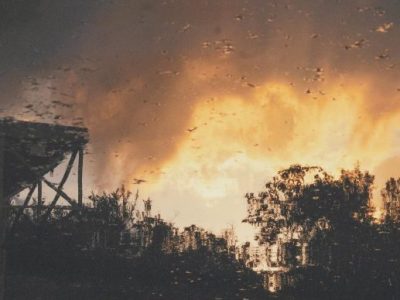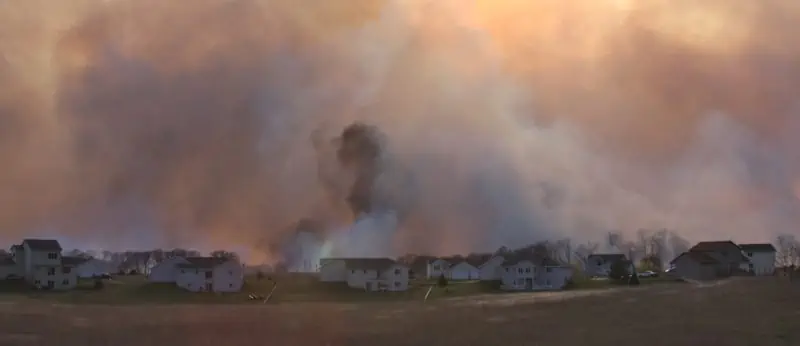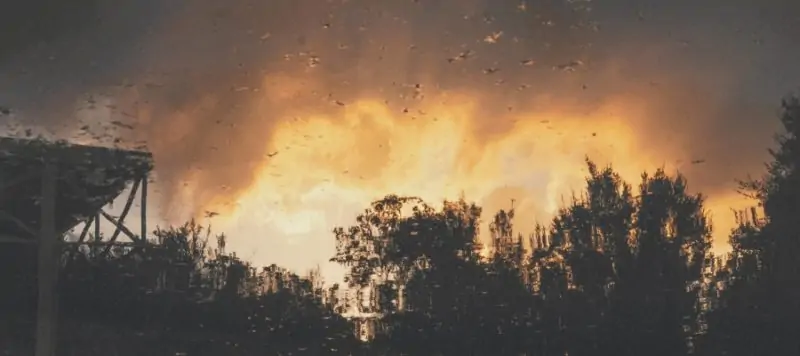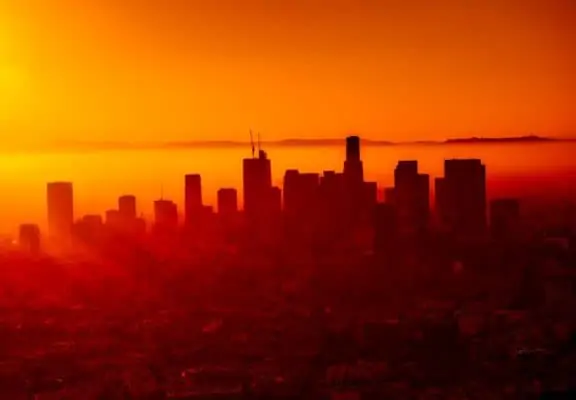CLIMATE CHANGE IS LEADING TO LONGER FIRE SEASONS, with more frequent, back-to-back, and persistent wildfire events. This not only poses a threat to communities threatened by the blaze itself; these changes can lead to smoke exposure for weeks or even months in communities far from the fires themselves.
Following a meeting at the National Academies of Sciences, Engineering, and Medicine, UCLA C-Solutions and Climate Resolve are partnering to shed light on the mental and physical health impacts of wildfires and smoke.
In a joint report published today, the researchers say that government, public health agencies, and the public generally need to understand the mental health impacts of wildfire smoke as the world enters a time in which wildfire smoke events are prolonged events.
“What happens when wildfires become chronic and persistent, like they did in Australia in 2019 and California in 2020?,” asked lead author Dr. David Eisenman, UCLA Fielding School of Public Health professor of community health sciences, professor of medicine at the David Geffen School of Medicine, and a director at the Fielding School’s Center for Healthy Climate Solutions (C-Solutions) and the school’s Center for Public Health and Disasters.
“Living under the lockdowns of the COVID-19 pandemic gives some sense of what this is like,” said Eisenman, who has studied the aftermath of disasters from Hurricane Katrina in 2005 to the 100,000-acre Woolsey Fire in southern California in 2018. “The isolation from community and the dread that leaving the house to go into the world outside is fundamentally dangerous—this might sum up the isolating and fearsome experience of the pandemic and persistent wildfire smoke events.”
The report – Mental Health Effects Of Wildfire Smoke, Solastalgia, and Non-Traditional Firefighters – was written by Eisenman; May M.T Kyaw, an MD candidate at UCLA; and Kristopher Eclarino, with Climate Resolve, a Los Angeles-based 501(c)(3).
In 2019, the National Academy of Medicine, as part of the National Academy of Sciences, Engineering, and Medicine, co-sponsored a review of “Public Health Implications of the California Wildfires for Health, Communities, and Preparedness.” Eisenman served as an organizer and presenter. The review raised – among many issues – the potential health effects of fine particulate air pollution (PM2.5 and PM10), and whether smoke from wildfires may have similar or different toxicities and the resulting physical and mental health impacts. This, in turn, led to the study published this week.
“Wildfires are occurring with increasing frequency and severity each year, and each year their impacts on people become clearer,” Kyaw said. “They displace entire communities, and their smoke can affect regions hundreds of miles away, and for days, weeks, or months at a time. However, very little is understood about how wildfires affect mental health.”
The research team reviewed the existing scientific literature on the mental health impacts of wildfire smoke, “solastalgia” from wildfires, and impacts on civilian and inmate firefighters.
“It is clear that as wildfires increasingly become a public health threat, the effects of their smoke on mental health need to be studied, “ Eclarino said. “There is a clear need for research on the effects of smoke, especially prolonged events and repeated events, and research on the side effects of various responder groups.”
The analysts found that the mental health impacts of wildfire smoke are not well understood; the quality and number of quantitative studies on the subject is limited. However, using eight qualitative studies, the team constructed a model of the mechanisms that may lead to any mental health impact.
Solastalgia, defined as the lived experience of stress from the loss of landscape, overlaps with broader topics of post-traumatic stress disease (PTSD), anxiety, grief, and other emotional and mental impacts of climate change and natural disaster. The effects in the aftermath of natural disaster have not been measured, raising questions about its burden, impact, and distribution.
Finally, this work found that there is little existing research focused on the mental health impacts of wildfires on civilian and inmate firefighters. These include residents who do not evacuate during a fire and instead stay to protect their homes and maybe other homes in the community during a wildfire, sometimes called “stay and defend.” A study of the 2018 Woolsey Fire in Los Angeles and Ventura counties in California and the 2015 Wallow Fire in Arizona found that generations of residents had stayed and defended against repeated fires in their regions, leading to repeated exposure to stress.
“In communities where people’s homes are threatened by wildfire flames, people are often faced with the difficult choice of whether to “stay and defend.” Those who leave are faced with the difficult task of returning to, and living in, burned land, which can lead to solastalgia,” Eisenman said. “We need more research to understand the effects of these experiences as the threat of wildfires becomes more severe.”
Methods: In order to identify topics for the National Academies of Science, Engineering and Medicine to address in the future, the team reviewed the literature on three mental health issues: wildfire smoke, solastalgia, and non-traditional firefighters. This narrative review was complemented by a systematic search to identify scientific papers published from 1990-2020 related to the three main topics.
Funding: This research was funded by the Burroughs-Wellcome Fund and the National Academy of Medicine.
Citation: Eisenman, David P., Kyaw, May M.T., Eclarino, Kristopher. “Review of the Mental Health Effects of Wildfire Smoke, Solastalgia, and Non-Traditional Firefighters,” UCLA Center for Healthy Climate Solutions, David Geffen School of Medicine at UCLA, & Climate Resolve. Los Angeles, CA. March, 2021.







